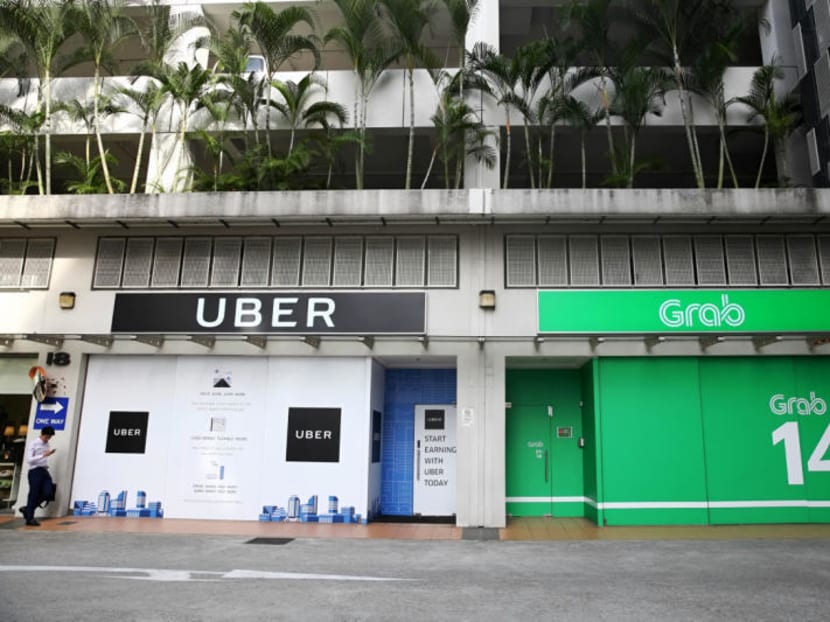More than 9,000 out of 10,000 Uber drivers switched to Grab after takeover: Khaw
SINGAPORE — Shedding light on the Grab-Uber deal's impact on employees and drivers, Transport Minister Khaw Boon Wan said on Monday (July 9) that more than 9,000 of the 10,000 drivers who had been driving exclusively for Uber have joined Grab.
SINGAPORE — Shedding light on the Grab-Uber deal's impact on employees and drivers, Transport Minister Khaw Boon Wan said on Monday (July 9) that more than 9,000 of the 10,000 drivers who had been driving exclusively for Uber have joined Grab.
In addition, affected employees among Uber's 300-strong workforce who were displaced by the deal and did not land jobs at Grab will be compensated in line with a labour advisory on responsible retrenchment, said Mr Khaw in a written parliamentary reply to Ms Joan Pereira, Member of Parliament (MP) for Tanjong Pagar.
Ms Pereira had asked Mr Khaw about the displaced workers, the help extended to them, and the deal's impact on public transport services.
In the wake of the takeover in March, about 300 former Uber staff were given paid leave of up to three months while Grab identified suitable jobs for them, said Mr Khaw.
Those who were not matched to jobs in Grab will be compensated according to the Tripartite Advisory on Managing Excess Manpower and Responsible Retrenchment, added Mr Khaw. The advisory offers guidance on responsible retrenchment practices, such as redundancy benefits.
Mr Khaw also revealed that Grab, which is based in Singapore, had committed to taking over and honouring the contracts of Uber's 300 to 400 contract workers.
As for drivers who did not cross over to Grab, government agency Workforce Singapore and the labour movement's Employment and Employability Institute are assisting them with their job hunts. The authorities are also working with the National Private Hire Vehicles Association and the National Taxi Association to assist the drivers in resolving outstanding payment and contractual disputes with Uber, Mr Khaw said.
Last week, Singapore's competition watchdog ruled that the sale of Uber's South-east Asia operations to Grab had led to a "substantial lessening of competition" and price hikes for Grab rides.
The Competition and Consumer Commission of Singapore (CCCS) also proposed remedies to restore competition in the market. These include removing exclusivity obligations and lock-in periods for drivers, as well as maintaining Grab's pre-merger pricing algorithm and commission rates.
It also proposed imposing fines on Grab and Uber for entering into the deal despite having anticipated potential competition concerns. Hitting back, Grab, which will appeal the CCCS' decision, criticised the commission for taking a "very narrow approach in defining competition".
Grab also said the watchdog's provisional findings and proposed remedies were "overreaching", and went against "Singapore's pro-innovation and pro-business regulations in a free-market economy".
Stressing that Singapore's point-to-point transport sector was still evolving and had not arrived at a "steady state", Mr Khaw reiterated that the authorities were monitoring developments and would intervene where necessary.
This included putting in place a fair regulatory framework to ensure that the sector stays open and contestable, so that no "single market player can dominate the industry to the detriment of commuters and drivers", Mr Khaw added.
In response to TODAY’s queries, a spokesperson from Grab said that the ride-hailing company wrapped up its discussions on job placements with all Uber employees at the end of June, and “made offers to a vast majority of Uber employees”.
The firm did not specify how many of Uber’s staff members were offered jobs and how many were not.
Grab added that Uber’s human resource team was “managing the severance of the employees who were not offered a role”, as part of its obligations under the labour advisory.
Its spokesperson stressed that the firm reached out to all Uber employees to find them a suitable role.
“We have had open conversations with Uber employees to understand their career aspirations, and where their experience is relevant, we have set up chats with multiple Grab functions to ensure everyone has the opportunity to find a role that provides continued career growth and personal development.”
The firm also said that it has “actively engaged and worked closely with” the Ministry of Manpower and the Tripartite Alliance for Dispute Management to ensure that the process was managed “in a fair and dignified manner”.









